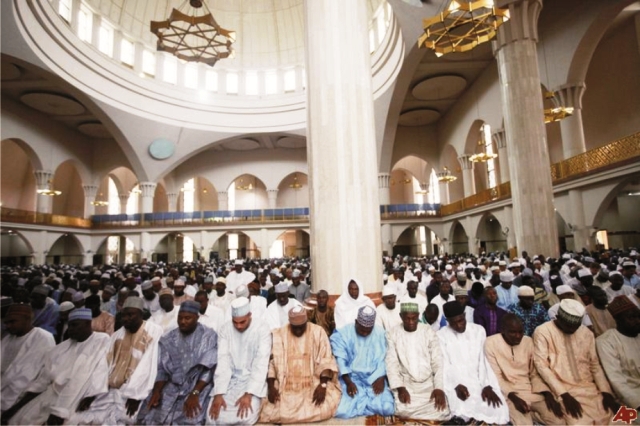Editorial
Eid el Fitri, Religion And Nigeria

The Muslim community across the globe
is celebrating eid el fitri (feast of break
ing fast) today. It marks the end of the month of Ramadan, when all true Muslims fast from dawn to dusk every day in observance of one of the major pillars of Islam.
The past one month is supposed to be one of the holiest for devotees of Islam, as they practised self denial, discipline, sacrifice, devotion and humility. Within the period, Muslims tried to get as close as possible to their God with a view to having better relations with their fellow human beings also.
The celebration of Eid el fitri will include the end to the fast, visits to friends and family, wearing of new clothes, perfumes and the presentation of gifts. Of course, some will go to the amusement parks, the beaches and other places where they can catch fun. It is like coming into newness of life.
As we wish the Muslim Umah a happy Eid el fitri, we hope that this annual spiritual reawakening will reflect in the way things are done in Nigeria. In fact, it has become more imperative that the major religions in Nigeria will learn to work together, rather than compete for supremacy at every facet of the country’s life.
It is worrisome that the two major religions pretend to be very holy, and 99% of the population is under their influence, yet Nigeria is counted among the most corrupt nation. The country is adjudged to be among the most insecure and poor nations of the world. This misnomer of having a pious people and a sinful nation must change.
Fast is a practice that is common to nearly all the religions of men. Apart from the practice of the ideals of the different religions during the fast, the attendant spiritual benefit should develop in the people a culture that should be pleasing to God and safe for man. But to suddenly forget to be selfless, humble and sacrificial after any fast is hypocritical.
Clearly, the religions have failed Nigeria and its people, but very few have bothered to ask if Nigeria itself had learnt to make the most of the religions. While Nigeria professes to be a secular State, its involvements with some of the religions, even in the way State funds are spent on them and their practices incorporated in governance is deceitful. To be torn between two religions makes matters even worse.
The Tide thinks that in spite of the failure of the political class to respect the letters and spirit of the nation’s constitution, the two major religions should expand areas of cooperation, mutual respect and commitment to the safety and survival of Nigeria, where all faiths, interests and origins should thrive freely.
In recent times, the activities of some persons who claim to be members of the Muslim Umah have tended to give Islam a very bad image all over the world. Not only did they justify their thirst for blood with the teachings of Islam, the Muslim nation ultimately takes pride and the feeling of conquest from such despicable acts.
While the real goal of religion should be to bring man to meet his God, the leaders of the religions have preferred to take people into their religions. This of course, has tended to polarise the population and created the basis for hate, conflict and the fight for supremacy just the same way the secret cults do. If truly God is one, how would all these please Him?
It is in fact curious that Christendom may have a lesson or two to learn from Islam. As the world appears to demonise Islam, it continues to be the fastest growing religion at least for now. People cannot still understand the allegation that Muslims kill their members that convert to Christianity yet do everything, even force others to convert to Islam.
It stands to the credit of Islam that without jihad or evangelism, they now control 58 countries in the world, while Christianity with all its signs and wonders lose grounds. It calls for a study that a religion that is at variance with the glittering lifestyle of the West would be the one more people would be running to. Clearly, there is something going on that should be identified.
We understand the virtue of soul-winning, but it must be to the glory of God and not for the building of an army to kill rival faiths or rival doctrinal groups. Public Holidays like this will soon lose their reason if religion becomes more of a problem for mankind than solution for human quests.
Editorial
Resolve Rumuwoji Market Issues, Others

Editorial
As NDG Ends Season 2

Editorial
Beginning A New Dawn At RSNC

-
Politics3 days ago
2027: NIGERIANS FAULT INEC ON DIGITAL MEMBERSHIP REGISTER DIRECTIVE
-

 Environment3 days ago
Environment3 days agoLAWMA Director Says Sweeping Reforms Have Improved Waste Collection
-
Politics3 days ago
LP Crisis: Ex-NWC Member Dumps Dumps Abure Faction
-

 Politics3 days ago
Politics3 days agoUmahi Dismisses Allegations On Social Media, Insists On Projects Delivery
-

 Sports3 days ago
Sports3 days agoAbia Not Sure To Secure continental Ticket
-
Politics3 days ago
NATASHA ELECTRIC VEHICLES INITIATIVE IN KOGI CENTRAL
-
Sports3 days ago
La Liga: Yamal Records First Career Hat-trick
-
Politics3 days ago
IT’S A LIE, G-5 GOVS DIDN’T WIN ELECTION FOR TINUBU – SOWUNMI

